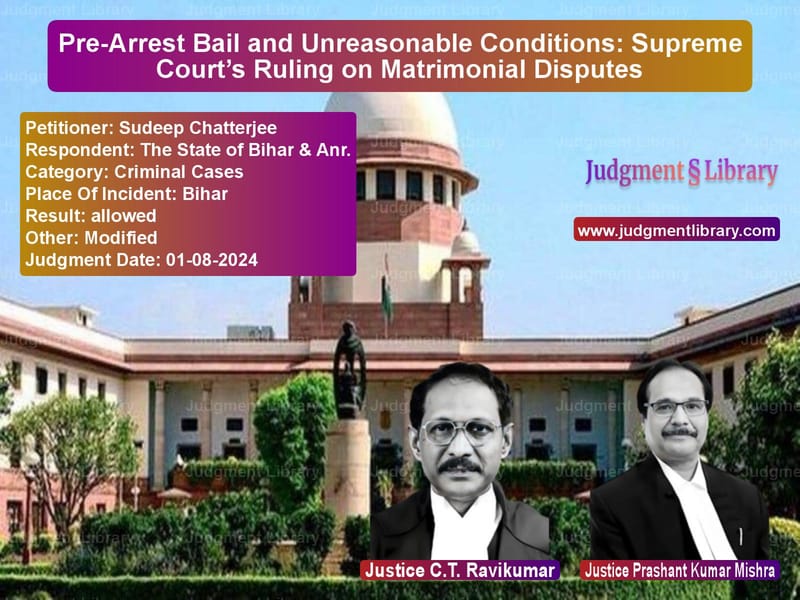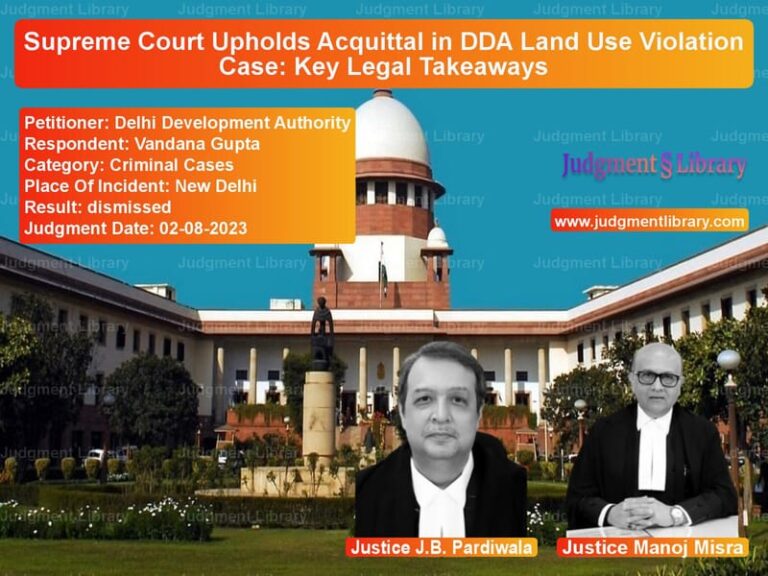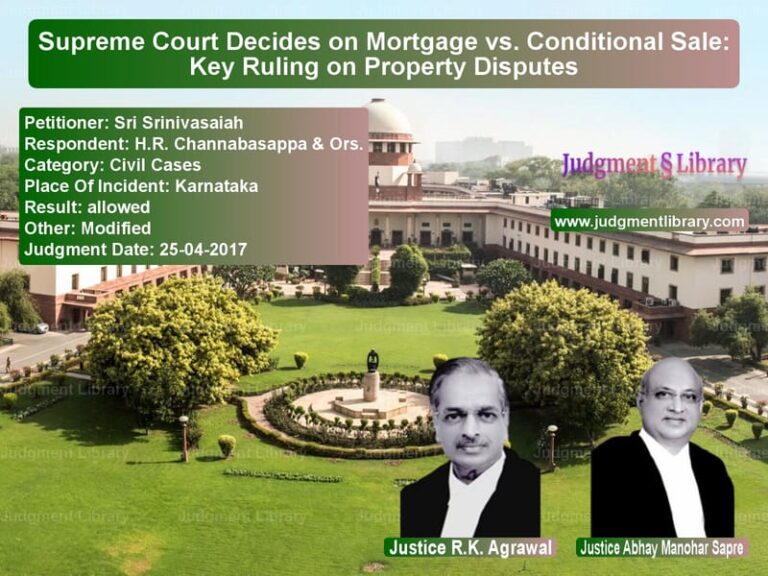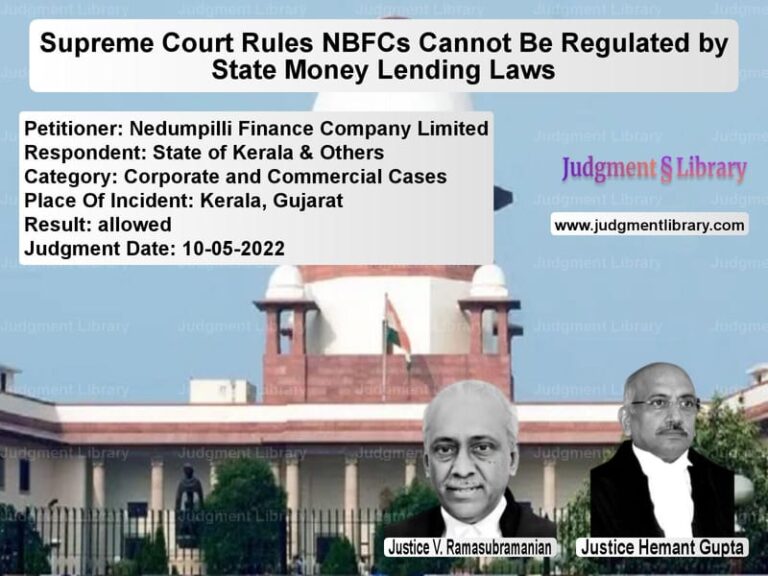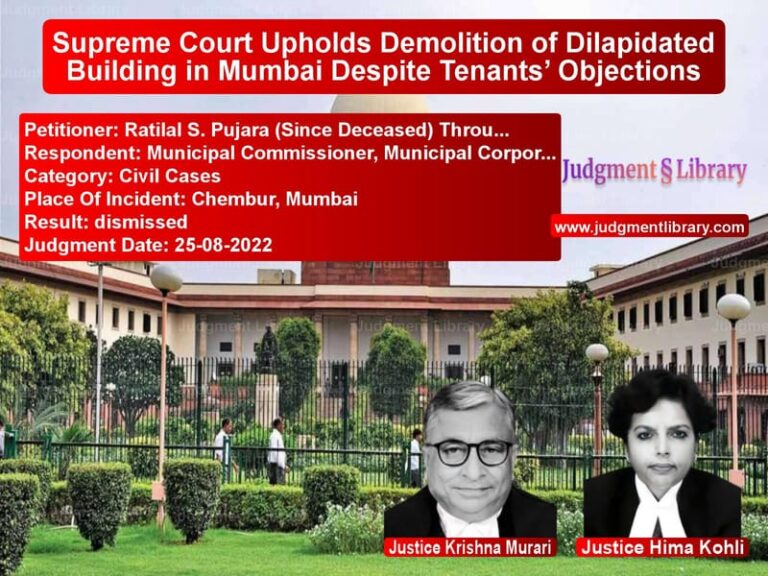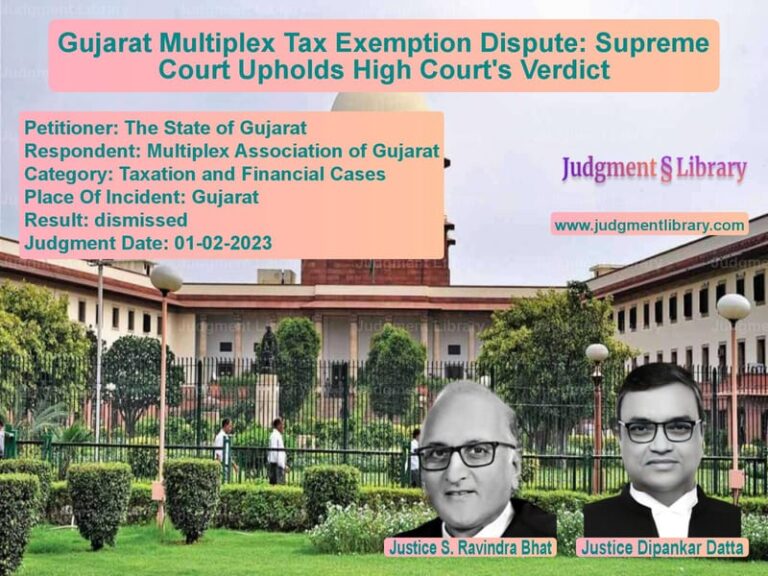Pre-Arrest Bail and Unreasonable Conditions: Supreme Court’s Ruling on Matrimonial Disputes
The Supreme Court of India recently delivered a significant judgment in the case of Sudeep Chatterjee vs. The State of Bihar & Anr., addressing the issue of unreasonable conditions imposed on pre-arrest bail, particularly in matrimonial disputes. The ruling reaffirms the principle that bail conditions should not be onerous or impractical and that courts must ensure fairness and dignity in legal proceedings.
The case arose from a complaint filed against the appellant, Sudeep Chatterjee, under Section 498A of the Indian Penal Code (IPC) and Section 4 of the Dowry Prohibition Act, 1961. The Patna High Court had granted him provisional pre-arrest bail but imposed conditions requiring him to file an affidavit stating that he would fulfill all the physical and financial requirements of his wife without interference from his family. The Supreme Court found this condition impractical and set it aside.
Background of the Case
The dispute originated from marital discord between the appellant and the second respondent (his wife). Due to irreconcilable differences, the appellant had filed for divorce in the Family Court, Bhagalpur. In response, the wife filed Complaint Case No. 1100 of 2021, alleging cruelty and dowry-related harassment under the aforementioned legal provisions.
Fearing arrest, the appellant initially sought anticipatory bail from the Sessions Court, Katihar, which was rejected on May 24, 2023. He then approached the Patna High Court, which granted him provisional bail but with the controversial condition of submitting an affidavit pledging to support his wife physically and financially.
Arguments by the Parties
Appellant’s (Sudeep Chatterjee) Arguments
- The High Court’s condition was impossible to fulfill and created an unfair burden on him.
- Marital discord and pending divorce proceedings made such a condition unrealistic and impractical.
- The condition effectively granted his wife control over his obligations without any judicial determination of the facts.
- The Constitution and legal precedents do not allow courts to impose unreasonable conditions that violate fundamental rights.
Respondent’s (Wife’s) Arguments
- The condition imposed by the High Court was justified because the appellant had a duty to maintain his wife.
- The appellant had voluntarily agreed before the High Court to withdraw the divorce petition and attempt reconciliation.
- The condition ensured that she would not suffer financially during the pendency of the trial.
- The appellant should not be allowed to escape responsibility simply by obtaining anticipatory bail.
Supreme Court’s Observations
The Supreme Court strongly criticized the High Court’s approach and reaffirmed key legal principles:
- “Lex non cogit ad impossibilia” – The law does not compel a man to do what he cannot possibly perform.
- “Bail conditions should not be so onerous that they make compliance impossible.”
- “Courts must ensure that conditions imposed while granting bail do not violate constitutional rights or personal dignity.”
- “A condition that gives one spouse complete control over another’s financial and physical commitments is unjust and counterproductive.”
- “Pre-arrest bail is a procedural safeguard to protect liberty, not a tool to enforce marital obligations.”
Key Legal Precedents Cited
1. Gurbaksh Singh Sibbia & Ors. vs. State of Punjab (1980)
The Constitution Bench had ruled that “denial of bail amounts to deprivation of personal liberty” and that courts must lean against imposing unnecessary restrictions on pre-arrest bail.
2. Parvez Noordin Lokhandwalla vs. State of Maharashtra (2020)
The Supreme Court observed that “bail conditions must bear a proportional relationship to the purpose they serve”. The imposition of conditions should not make bail illusory.
Final Judgment
The Supreme Court modified the High Court’s order by removing the condition requiring an affidavit. However, it upheld the grant of anticipatory bail with the usual conditions under Section 438(2) of the Cr.P.C., which includes:
Read also: https://judgmentlibrary.com/supreme-court-acquits-man-in-wifes-murder-case-due-to-lack-of-evidence/
- The appellant must cooperate with the investigation.
- He must not directly or indirectly influence witnesses.
- He must not leave the country without prior court permission.
The Court also expressed hope that the parties would make genuine efforts to reconcile, but made it clear that marital obligations should not be dictated through bail conditions.
Implications of the Judgment
This ruling sets an important precedent for bail jurisprudence in India:
- Limits on Bail Conditions: Courts must ensure that conditions imposed are reasonable, practical, and proportionate to the purpose of bail.
- Protection Against Arbitrary Conditions: Prevents misuse of bail conditions to impose unfair obligations in matrimonial disputes.
- Reaffirmation of Personal Liberty: Highlights that pre-arrest bail is a procedural safeguard and not a tool for coercion.
- Encouragement of Judicial Restraint: Emphasizes that courts should avoid interfering with personal relationships through procedural orders.
The judgment reinforces the constitutional principles of fairness and proportionality in legal proceedings. It ensures that personal liberty is protected while also safeguarding the interests of all parties involved in matrimonial disputes.
Petitioner Name: Sudeep Chatterjee.Respondent Name: The State of Bihar & Anr..Judgment By: Justice C.T. Ravikumar, Justice Prashant Kumar Mishra.Place Of Incident: Bihar.Judgment Date: 01-08-2024.
Don’t miss out on the full details! Download the complete judgment in PDF format below and gain valuable insights instantly!
Download Judgment: sudeep-chatterjee-vs-the-state-of-bihar-&-supreme-court-of-india-judgment-dated-01-08-2024.pdf
Directly Download Judgment: Directly download this Judgment
See all petitions in Bail and Anticipatory Bail
See all petitions in Domestic Violence
See all petitions in Legal Malpractice
See all petitions in Judgment by C.T. Ravikumar
See all petitions in Judgment by Prashant Kumar Mishra
See all petitions in allowed
See all petitions in Modified
See all petitions in supreme court of India judgments August 2024
See all petitions in 2024 judgments
See all posts in Criminal Cases Category
See all allowed petitions in Criminal Cases Category
See all Dismissed petitions in Criminal Cases Category
See all partially allowed petitions in Criminal Cases Category

